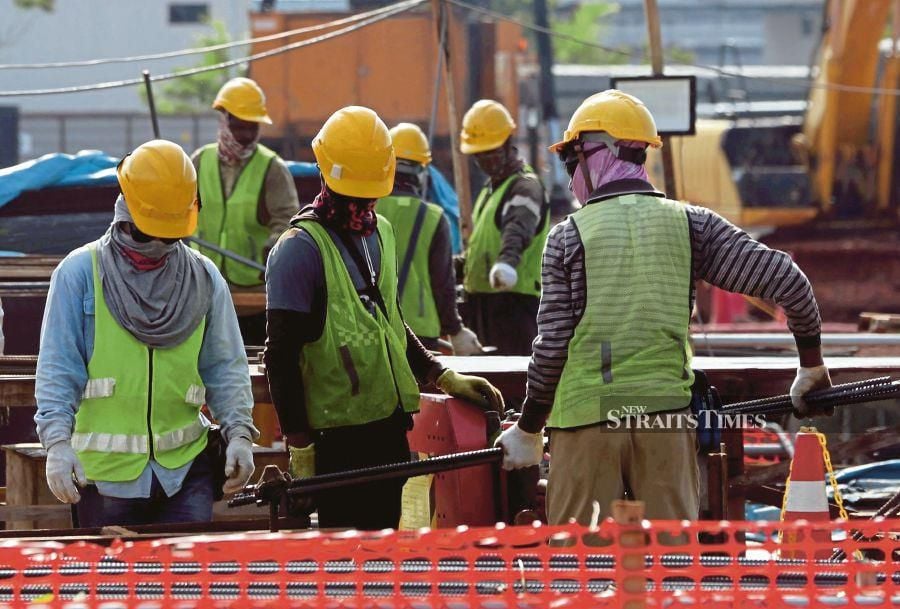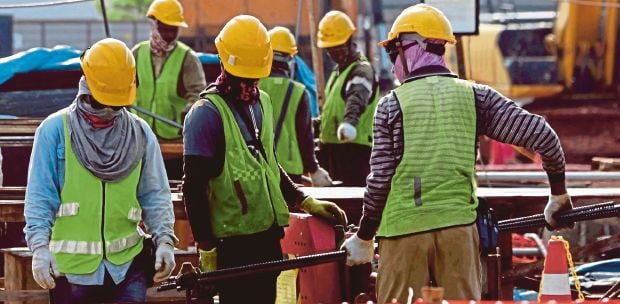KUALA LUMPUR: Painting a picture that employers are abusing their foreign workers by not providing jobs is bad for the economy and image of the country, said the Malaysian Employers Federation (MEF).
Its president Datuk Dr Syed Hussain Syed Husman said generalising without actual data is misleading.
"Most employers who have applied for foreign labour have utilised the number of foreign workers brought in. Unless the authorities can show the data of employers and a number of foreign workers without jobs it is only an assumption."
He added, such a negative statement on employers is not fair and not right.
"The authorities should not use one or two examples to paint a bad picture of employers. Employers are a very responsible group who are doing their best to be more productive and competitive.
"MEF is of the view that if the system of recruiting foreign workers is bad and may lead to abuse, then go and fix it.
"It is not appropriate to pass blanket statements to discredit employers. We must go to the source of the problems in recruiting foreign labour and address it."
He said MEF also called on authorities to publish the list of employers who have flouted the laws.
"Do the authorities have a list of employers that have not offered jobs to their foreign workers? All these accusations of employers not giving jobs to their foreign workers are without merit if without data.
"The authorities need to show the data if there is, and compare it to the population of employers that fulfilled their obligations on recruiting foreign workers."
He said the MEF has always taken the stand that there must be a single entry and exit ministry that deals with the recruitment and management of foreign workers.
"MEF has always stood and said that the Human Resources Ministry is the sole ministry that deals with the recruitment and management of foreign workers.
"The ministry should be the sole ministry where all labour needs are placed. If this happens there will be transparency and accountability of foreign workers brought into this country."
Syed Hussain said there were many reasons for the excess of foreign labour in Malaysia.
"A large number of foreign labourers were brought in by approved recruitment companies. There were situations where they brought in more than needed, hence resulting in an oversupply of foreign labour.
"However, sometimes there are cases where the employers need changes based on the global challenges and as a result, the demand is less than earlier predicted.
"This too can lead to excess of foreign labour. Therefore we must study the reasons and address these issues at source.
"We cannot pass blanket comments to penalise all employers that may have genuine reasons for not being able to provide foreign workers brought into the country."
He said MEF agrees that actions must be taken against irresponsible recruiters who indiscriminately bring in foreign workers without jobs.
"However, we must recognise that due to valid reasons, demand reduces. We cannot have the same action for all employers. If we correct the issues at source, only then will the problem end."
He said better mechanisms need to be looked at to assist employers in difficulties rather than taking the simple way by penalising them RM 30,000 for their failure to provide work to foreign workers within 30 days from the date of arrival.
"It is unfair to penalise employers of RM 30,000 per headcount, as it will not assist companies already in financial difficulties. Such a move should be avoided."
Syed Hussain said since the foreign workers were already in the country, suitable mechanisms need to be put in place to fully utilise the workers rather than just repatriating them.
"For those legal foreign workers who are already here, but their employers cannot provide them work for whatever reason, mechanisms need to be put in place to redeploy them to other sectors and employers that need them. It's a win-win solution.
"Mechanisms need to be put in place to obtain the voluntary agreement of the workers involved to work in some other sectors and with some other employers."
He added that an equitable formula needs to be drawn up where the first employer that brings in the worker but is not able to provide jobs should be compensated by the second employer for the costs incurred in bringing in the foreign workers.
He said it is a known fact that the costs of hiring legal workers can be very expensive, with the total cost of hiring a legal foreign worker being between RM 20,000 and RM 25,000 per worker.
Syed Hussain said for the rubber plantation sector; "It is a known fact that the sector cannot find suitable tappers to work in rubber plantations.
"Rubber tappers require specialised skills to tap rubber as otherwise the rubber trees will be wounded and cannot be used anymore.
"Not many workers, including foreign workers, are interested in working in rubber plantations. The rubber industry is labour intensive with a ratio of 1:1.5ha, compared with palm oil plantations where the ratio is 1:15 ha."
He added that many companies with rubber plantations are converting to some other viable crops.
"Rubber plantation owners need to be realistic about rubber cultivation in Malaysia. Due to the shortage of workers to work in rubber plantations, they should switch to other crops such as oil palm, coconut and durian."
On Jan 4, the Plantations and Commodities Minister Datuk Seri Johari Abdul Ghani proposed that companies be fined up to RM30,000 for each foreign worker brought in who is not employed after a month.
He said that after attending his ministry's monthly assembly.
The move, Johari said, would force companies to reconsider bringing in workers if they could not guarantee employment.
The Titiwangsa member of parliament said it is also to ensure the issue does not persist; otherwise, whenever people talk about Malaysia, it will be associated with forced labour.
The next day (Jan 5), Johari in a Facebook post reiterated his proposal, saying the compound would also cover the cost of the foreign workers' repatriation to their home countries.
Johari said he was compelled to propose the compounds following the incident on Dec 20, where 171 Bangladeshi workers in Kota Tinggi, Johor, were detained after walking en masse to the Bayu Damai Police Station as the employment companies or agents refused to offer them jobs after three to six months.






